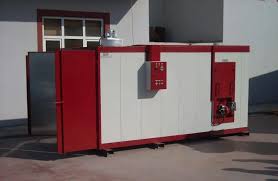In industrial settings, curing ovens play a vital role in ensuring materials achieve desired qualities, such as hardness, durability, and adhesion. Electric curing ovens, in particular, have gained popularity due to their efficiency, precision, and environmental benefits. The top advantages of using electric curing ovens for industrial needs, from quality improvements to energy efficiency.
Precision Temperature Control
Electric curing ovens offer precise temperature control, which is critical for curing processes that demand consistent heat. By maintaining a steady temperature, these ovens help ensure that materials, such as coatings, paints, and adhesives, cure evenly. This precision reduces the risk of over-curing or under-curing, which can lead to material defects or compromised performance.
Enhanced Energy Efficiency
One of the key benefits of electric curing ovens is their energy efficiency. Unlike traditional ovens, which can lose a significant amount of heat, electric curing ovens are designed to maintain temperature without excessive energy loss. This feature not only reduces operational costs but also makes them more environmentally friendly. Industrial facilities focused on energy conservation often find electric ovens an ideal choice for reducing their carbon footprint.
Faster Heating and Curing Times
Electric curing ovens can reach optimal temperatures quickly, allowing for faster heating and curing times compared to other oven types. This speed enhances productivity, enabling manufacturers to meet high production demands efficiently. In industries where quick turnaround is essential, this time-saving feature provides a substantial competitive advantage.
Consistent Quality and Reliable Results
Electric curing ovens provide a controlled environment, ensuring uniform heating across materials. This consistency is essential for achieving a high-quality finish in products like painted or powder-coated surfaces. By eliminating uneven curing, electric ovens reduce product rejection rates and the need for rework, leading to better overall product quality and customer satisfaction.
Reduced Emissions and Cleaner Operation
Electric curing ovens are a cleaner alternative to gas or other fuel-based ovens. They produce no combustion by-products, which means there are fewer airborne pollutants released into the workspace. This cleaner operation contributes to a safer working environment for employees and aligns with environmental regulations that restrict emissions in industrial facilities.
Compact and Versatile Design Options
Electric curing ovens come in a variety of sizes and configurations, making them suitable for a wide range of industrial applications. From small batch processes to large-scale production, manufacturers can select an oven design that meets their specific needs. This versatility allows businesses to invest in an electric curing oven that fits both their production requirements and spatial constraints.
Cost Effective Maintenance and Longevity
Electric curing ovens are generally easier to maintain than fuel-based ovens, as they have fewer moving parts and don’t require fuel lines or burners. Their simpler design translates to lower maintenance costs and a longer lifespan. With proper care, an electric curing oven can serve an industrial facility reliably for many years, making it a cost-effective investment over time.
Enhanced Safety Features
Safety is a priority in any industrial setting, and electric curing ovens are equipped with advanced safety features. Many models come with automatic shutoff mechanisms, alarms, and temperature control systems to prevent overheating. These features protect both the machinery and personnel, reducing the risk of accidents in the workplace.
Ideal for Environmentally Sensitive Applications
For industries that require environmentally safe operations, electric curing ovens are an excellent choice. Because they do not rely on fuel combustion, they emit fewer pollutants, making them ideal for applications in sensitive environments such as food production or cleanroom manufacturing. This makes electric curing ovens a sustainable option for industries with strict environmental standards.
Improved Process Control and Monitoring
Electric curing ovens are often integrated with advanced control systems that allow operators to monitor and adjust temperature, humidity, and other variables remotely. This enhanced process control leads to better consistency and reduces human error. Industrial settings that require high precision in curing can benefit greatly from this capability, as it ensures repeatable, reliable results.
Conclusion
Electric curing ovens are invaluable assets for many industries, offering a range of benefits from energy efficiency and precision to improved safety and ease of maintenance. By investing in electric curing technology, industrial facilities can enhance product quality, reduce costs, and meet environmental standards effectively. With their flexibility and performance, electric curing ovens continue to be a preferred choice for manufacturers across diverse sectors.


